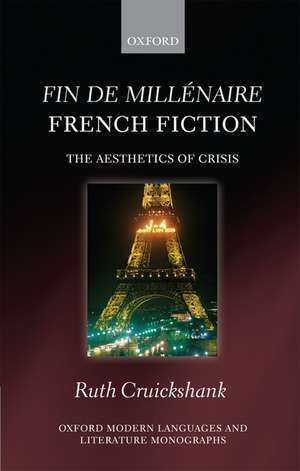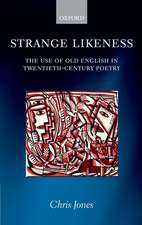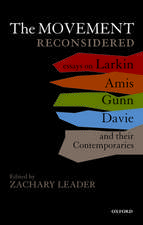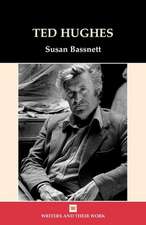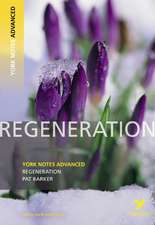Fin de millénaire French Fiction: The Aesthetics of Crisis: Oxford Modern Languages and Literature Monographs
Autor Ruth Cruickshanken Limba Engleză Hardback – 8 oct 2009
Din seria Oxford Modern Languages and Literature Monographs
- 27%
 Preț: 488.30 lei
Preț: 488.30 lei - 28%
 Preț: 498.29 lei
Preț: 498.29 lei - 28%
 Preț: 403.98 lei
Preț: 403.98 lei -
 Preț: 220.24 lei
Preț: 220.24 lei - 30%
 Preț: 529.17 lei
Preț: 529.17 lei - 23%
 Preț: 473.14 lei
Preț: 473.14 lei - 28%
 Preț: 498.33 lei
Preț: 498.33 lei - 16%
 Preț: 471.35 lei
Preț: 471.35 lei - 16%
 Preț: 472.12 lei
Preț: 472.12 lei - 34%
 Preț: 1196.78 lei
Preț: 1196.78 lei - 34%
 Preț: 844.61 lei
Preț: 844.61 lei - 30%
 Preț: 628.12 lei
Preț: 628.12 lei - 34%
 Preț: 550.53 lei
Preț: 550.53 lei - 47%
 Preț: 339.43 lei
Preț: 339.43 lei - 34%
 Preț: 946.68 lei
Preț: 946.68 lei - 34%
 Preț: 977.57 lei
Preț: 977.57 lei - 46%
 Preț: 447.51 lei
Preț: 447.51 lei - 30%
 Preț: 714.11 lei
Preț: 714.11 lei - 38%
 Preț: 327.25 lei
Preț: 327.25 lei - 34%
 Preț: 1169.33 lei
Preț: 1169.33 lei - 34%
 Preț: 1166.63 lei
Preț: 1166.63 lei - 34%
 Preț: 847.82 lei
Preț: 847.82 lei - 31%
 Preț: 861.06 lei
Preț: 861.06 lei - 45%
 Preț: 190.60 lei
Preț: 190.60 lei - 31%
 Preț: 363.64 lei
Preț: 363.64 lei - 23%
 Preț: 275.97 lei
Preț: 275.97 lei - 31%
 Preț: 787.32 lei
Preț: 787.32 lei - 34%
 Preț: 1167.72 lei
Preț: 1167.72 lei - 45%
 Preț: 468.18 lei
Preț: 468.18 lei - 34%
 Preț: 1109.57 lei
Preț: 1109.57 lei - 34%
 Preț: 1080.11 lei
Preț: 1080.11 lei - 30%
 Preț: 699.95 lei
Preț: 699.95 lei - 34%
 Preț: 934.25 lei
Preț: 934.25 lei - 30%
 Preț: 625.20 lei
Preț: 625.20 lei - 34%
 Preț: 992.04 lei
Preț: 992.04 lei - 34%
 Preț: 816.70 lei
Preț: 816.70 lei - 51%
 Preț: 829.26 lei
Preț: 829.26 lei - 30%
 Preț: 773.81 lei
Preț: 773.81 lei - 34%
 Preț: 530.74 lei
Preț: 530.74 lei - 30%
 Preț: 658.73 lei
Preț: 658.73 lei - 34%
 Preț: 845.75 lei
Preț: 845.75 lei - 31%
 Preț: 802.74 lei
Preț: 802.74 lei - 34%
 Preț: 1034.42 lei
Preț: 1034.42 lei - 34%
 Preț: 1254.44 lei
Preț: 1254.44 lei - 31%
 Preț: 387.21 lei
Preț: 387.21 lei - 51%
 Preț: 698.53 lei
Preț: 698.53 lei - 28%
 Preț: 462.34 lei
Preț: 462.34 lei - 34%
 Preț: 947.44 lei
Preț: 947.44 lei - 34%
 Preț: 887.47 lei
Preț: 887.47 lei
Preț: 656.78 lei
Preț vechi: 1240.02 lei
-47% Nou
Puncte Express: 985
Preț estimativ în valută:
125.75€ • 128.99$ • 105.87£
125.75€ • 128.99$ • 105.87£
Carte tipărită la comandă
Livrare economică 15-21 februarie
Preluare comenzi: 021 569.72.76
Specificații
ISBN-13: 9780199571758
ISBN-10: 0199571759
Pagini: 304
Dimensiuni: 144 x 223 x 21 mm
Greutate: 0.52 kg
Editura: OUP OXFORD
Colecția OUP Oxford
Seria Oxford Modern Languages and Literature Monographs
Locul publicării:Oxford, United Kingdom
ISBN-10: 0199571759
Pagini: 304
Dimensiuni: 144 x 223 x 21 mm
Greutate: 0.52 kg
Editura: OUP OXFORD
Colecția OUP Oxford
Seria Oxford Modern Languages and Literature Monographs
Locul publicării:Oxford, United Kingdom
Recenzii
To prepare for the discussion of these writers she begins with a brilliantly informed analysis of the 'long twentieth-century', concentrating on the last twenty years. She engages with the major topics of recent concern: the absence of the grand écrivain, the increased sensitivity towards violence against women, l'exception française, the rise and perhaps decline of feminism, and crisis manipulation by the media and trendy intellectuals. These pages display a combination of impressive research and remarkably clear synthesis. Her findings enable her to demonstrate that 'the defining features of the fin de millénaire French literary field are heterogeneity and competing crisis discourses' (p. 60), thus giving the lie to recent claims that France's literary and intellectual life has been enduring a period of prolonged hibernation. This section highlights Cruickshank's considerable gifts as a cultural historian.
Notă biografică
Ruth Cruickshank is Senior Lecturer in French at Royal Holloway, University of London. She was educated at the University of Leeds and at Lady Margaret Hall and the Queen's College, Oxford. Her research investigates how post-war French writers, filmmakers, and thinkers respond to, resist, and contribute to the development of consumer culture in France. She investigates the political and aesthetic potential of turn-of-the-millennium French prose fiction; and the ways in which representations of food and drink in literature, cinema, and thought elucidate the relationship between aesthetic developments, consumption, and identity narratives in post-war France. She has written on Ernaux, Houellebecq, and Redonnet; on representations of food, drink, and consumption in the cinema of the Trente Glorieuses, Claire Denis, and Agnès Varda; and on globalization and symbolic violence in recent filmic images of Paris.
